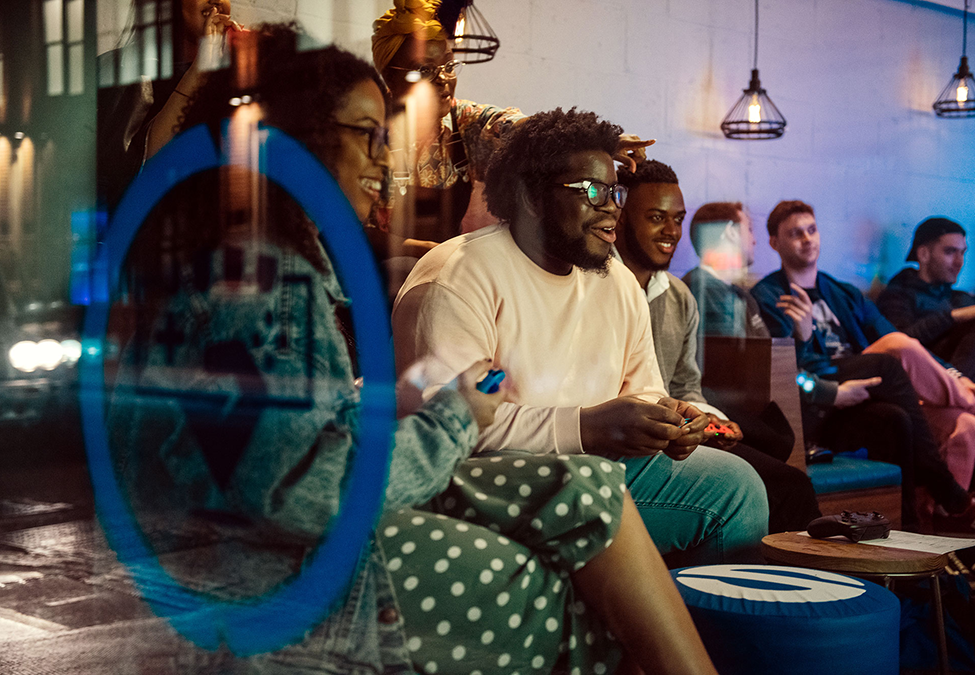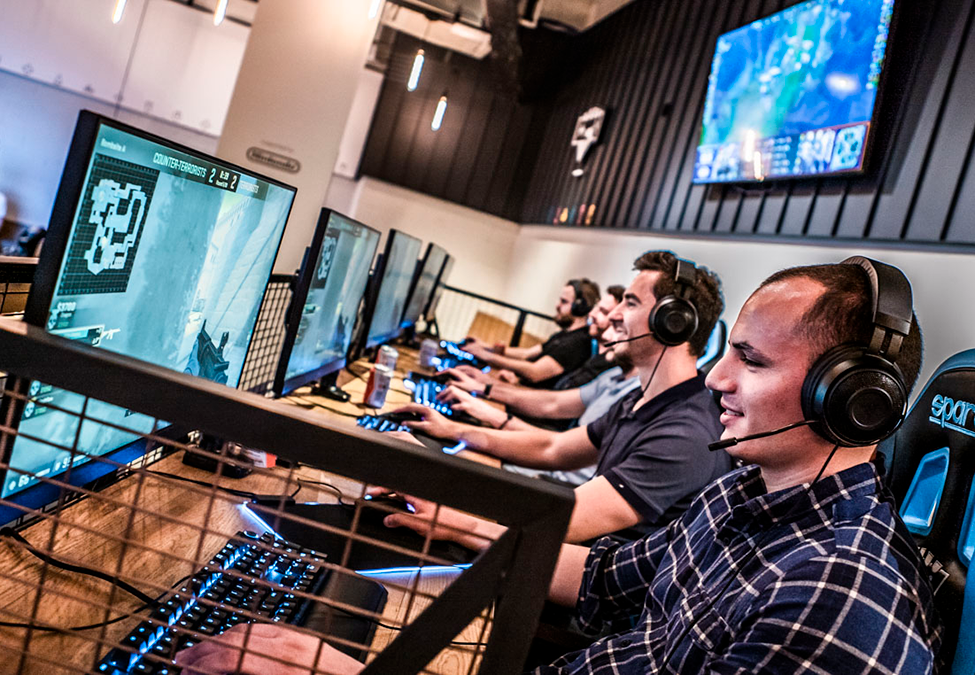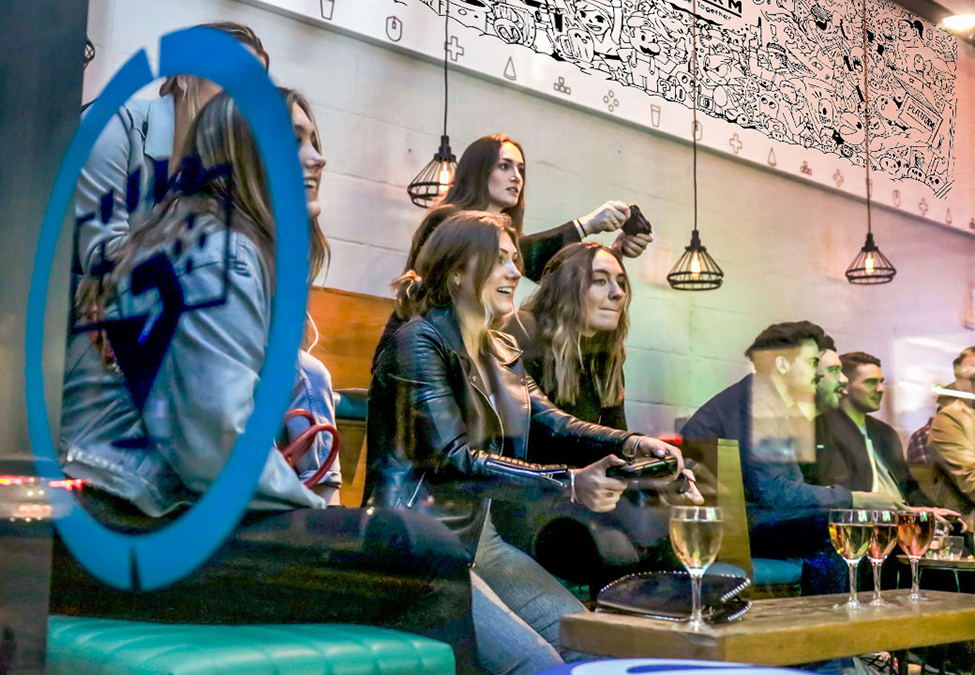They may be adjusting to life under lockdown, but that hasn’t stopped the owners of Platform from making big plans.
Located in Shoreditch at the heart of London, Platform blends a vibrant, modern aesthetic with classic video game setups: think consoles, couches, and rows of PCs that don’t come cheap. Indeed, headline investments into gaming and esports spaces are ubiquitous these days, but that doesn’t mean everyone’s cracked the code on what makes a space stand out—or how to replicate the success of the internet cafe culture that’s prevalent in Korea and China.
We spoke to Platform’s co-founders, brothers Tomaso Portunato, CEO, and Nicolò Portunato, COO, to hear their thoughts on some of the current trends in esports bars and venues throughout the western hemisphere.

Esports Insider: Let’s start with your own vision for Platform and beyond. Do you aim to eventually start a franchise? What kind of long-term aspirations are on the table?
Tomaso Portunato (TP): The franchise model I think is a bit early for us to really know and back what we say. But I think the intuition we have, and what we’ve seen in the past, is that it’s better not to have a franchise than to have a shaky franchise. We’ve seen that in some gaming concepts, but I’ve seen that in other, just standard hospitality concepts [too]: that an early aggressive franchise model can lead to brand dilution and inconsistency in the experience offered to our customers. And that’s something we really want to avoid. So it’s something that we’ll consider, but probably at the next stage of growth.
Where we are on our little map now is that we have our really expensive MVP that’s working, it’s profitable, so that’s good. Next step is to see if we can set up an operation that’s not based on the one location, but the next step is three. So that’s where we’re trying to go, and I think from three to five or eight—this is where we’ll consider franchises.
“Gaming is not enough for a venue like ours. This is a thing we realized last year, and I think where maybe other venues made the mistake.”
In terms of the concept we want to deliver, I think with our current venue we tried a bit of everything. So there’s a bit of esports, there’s a bit of really casual gaming. There’s a bit of retro, there’s a bit of racing simulators. So there’s a bit of everything.
Now, we want to focus on more focused concepts. So the next concept we’re working on now is really focused around the social gaming aspect and the inclusivity about that. It’s a bit less esports-y, it’s a bit more of a “Nintendo” type of vibe, but in the experience market. So that’s currently where we are.
Nicolò Portunato (NP): I think also one thing that we’ve realised is gaming is not enough for a venue like ours. This is a thing we realised last year, and I think where maybe other venues made the mistake. We don’t know yet because we don’t have the answer for the best concept. But we think definitely that the gaming is just the anchor, to make people come in.
“It has to be a full package we deliver to the customer to create enough value for people to think ‘Okay, maybe I’m not going to play from home today.'”
TP: What we’ve seen in other gaming bars and concepts around—and you know, we haven’t seen them all—but we’ve travelled to Korea, we’ve seen the PC bangs there, the inception and the cultural phenomenon they represent. We went back to the UK, looked at what is currently here. And it seems that a lot of these places take pride in performance-centric, hardcore gaming rigs that you can have at home. That’s the type of vibe they create. And our angle is: okay, well having a good rig, good hardware and well-maintained hardware is a given. But what we’re trying to offer is a whole experience that goes around it and that goes through the servers, food, drinks, the lighting, the atmosphere, the music. So there’s a combination that goes around it, that we put more importance in, right?
So, for us, it’s not good enough just to have some good hardware in the venue. It has to be a full package we deliver to the customer to create enough value for people to think ‘Okay, maybe I’m not going to play from home today, but actually I’ll go there because it’s a different type of experience’.

ESI: Something that we’ve seen a lot of, in the West, is an investment into more “professional” kinds of spaces. You guys have gone for a more social route with Platform. Do you think that will be part of a larger trend here, or is that something that you’ve carved out a specific niche for?
TP: From what I know of the East, and I’m not an expert on that, but what I’ve seen with my own eyes is that for groups of young people in Korea, it’s the cool thing to gather a group of 10 and go to a PC bang and spend maybe six, seven, eight hours there. I didn’t see these guys as the hardcore gamers of the population, but it’s a casual thing for people to do. I think in the West, from 18 to 20 years old, the type of activity an average 18 to 20-year-old does is a lot different. They probably don’t play as many games, right? So I think just copy-pasting the Asian concept to Europe just doesn’t match what actual young people do here in Europe.
What people do here in Europe when you’re 18 or 20 as a social thing is you go to a bar, to restaurants, and it’s a different way of socialising, right? I think copy-pasting a Chinese/Korean model is not going to create you European or Western versions of gaming bars. So what we’ve done is try and take what’s good about these Eastern models: a fairly well-run operation, in terms of the gaming and how it works, and the rig is good and there’s a bit of atmosphere there; but focus more on what people really like in the Western world, which is the more social aspect to it. Food, drinks, music, entertainment that goes beyond gaming.
“What we’re trying to do now, I think is the angle that’s gonna, within the next few years, be really popular around the US and Europe.”
And I think what’s going to happen now with these concepts here—in London we have Wanyoo, I don’t think they’re going to close because they have an Eastern customer base here. But I think what’s going to take off is… What we’re trying to do now, I think is the angle that’s gonna, within the next few years, be really popular around the US and Europe.
NP: I think the current situation has kind of helped us, in terms of gaming culture getting bigger and bigger. We’ve seen in the last few weeks or months that people are playing video games more and more due to the fact that people have to self-isolate or stay at home, et cetera, et cetera. And when [gaming] in Europe and in the United States is going to get as important as in the Eastern countries like China and Korea, then people are really going to go out to play video games and think that it’s cool—because it’s still kind of in-between cool and not cool.
You know the World Health Organization said a few months ago that gaming was addictive and they’ve recommended it now. So when people will accept that video games are something that’s a social thing, that’s cool—we see more and more luxury brands go into it—when people are going to get used to that, then I think people are going to go ‘Okay, a place with video games is going to be somewhere where you can share moments and have a beer and a good time.’

ESI: It has certainly been trending in that direction.
NP: Yeah. To get back to expansion things: we’re working very hard on what’s going to be this offering. So we don’t have the recipe yet, but now we’ve looked at all the data from the last year of people playing on a console, computers, retro gaming and what people consume, on food and beverages. And now we’re trying to get the best offering possible, looking at these numbers.
TP: The idea is that we have a potential site we’re working on now, that we hope we would be opening in time for the end of the Christmas period. But you know, nothing’s set in stone yet, as it’s difficult. It’s a big chess board and a lot of these chess pieces are on furlough. So it’s difficult to get everyone moving.
ESI: Is there anything else you guys would like to discuss?
TP: We’re going through a more social gaming route now, but hopefully our next step after the social gaming venue we’re trying to open is going to be a lot more esports-centric. We can’t really discuss details right now because nothing has been a hundred percent set in stone, but we’re working on a project to create an esports concept that has within it a small-sized stadium that’s really focused around esports.
I know this has been done around the world, but we want to take our angle on it where we create a hangout space for more esports-centric people and that’s going to be also with food, drinks and a social atmosphere, but which is attached to a more serious, high-level competition, small-sized stadium.
And we’re trying to build that hopefully within 12 months from now. Hopefully, it will be the first of its genre in the UK. So that’s our next step.
[maxbutton id=”13″ ]
